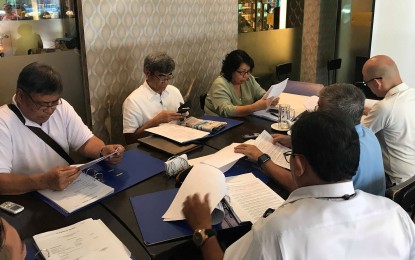
PAY HIKE. The Eastern Visayas Regional Tripartite Wages and Productivity Board sign Wage Order No. 20, raising the minimum daily pay for workers in the private sector. (Photo courtesy of RTWPB Region 8)
TACLOBAN CITY -- Workers in the private sector in Eastern Visayas may receive higher daily pay by next month after the Regional Tripartite Wages and Productivity Board (RTWPB) recently approved the new wage order for the region.
RTWPB Chairman Cyril Ticao, regional director of the Department of Labor and Employment (DOLE), said on Thursday that the regional wage body raised the minimum daily wage within the range of PHP20 to PHP30 after a series of consultations with workers and employers.
Wage Order No. 20 signed by the regional board on May 7 is still up for review by the National Wages and Productivity Commission (NWPC).
Ticao is confident that the wage adjustment will be approved within May and it will take effect by June after publication.
From a minimum daily pay of PHP285 under Wage Order No. 19, workers in the non-agriculture sector including sugar mills are entitled to a PHP305 daily wage under the new order.
The board ruled to increase the pay for those employed in the retail services (with 11 up to 30 workers) to PHP305 from PHP275. For workers in smaller retail businesses (with 10 employees and below), the new minimum daily pay is PHP275 or a PHP30 increase.
Workers in the farming sector are the lowest income earners covered by the directive with a daily pay of PHP269 for sugar farm workers and PHP275 for non-sugar plantation workers under Wage Order No. 20. The board approved a PHP24 wage adjustment for farm workers.
“We are optimistic that the NWPC will approve the wage rates because this was carefully reviewed by RTWPB members after series of consultations in the six provinces,” Ticao said.
The board reviewed the region’s wage structure through “motu proprio” noting the increasing prices of fuel and basic commodities. “Motu proprio” is an official act taken without a formal request from any party.
The consultations checked the economic conditions, adjustment of prices of basic goods and services, and impact of wage adjustment to both workers and business owners.
Since February, the wage body has been evaluating the impact of Tax Reform for Acceleration and Inclusion (TRAIN) law to workers in the private sector.
President Rodrigo Duterte on December 19, 2017 signed the TRAIN law, which imposes higher taxes on fuel, cars, coal, tobacco, mining, and some sugar-sweetened beverages.
The measure exempts those earning an annual taxable income of PHP250,000 and below from paying personal income tax. The board is convinced that excise tax in petroleum products has raised the prices of basic goods and services.
The regional board in Eastern Visayas is a tripartite body composed of six members -- three representatives from the government, two from the workers sector and one from the employers sector. (PNA)
